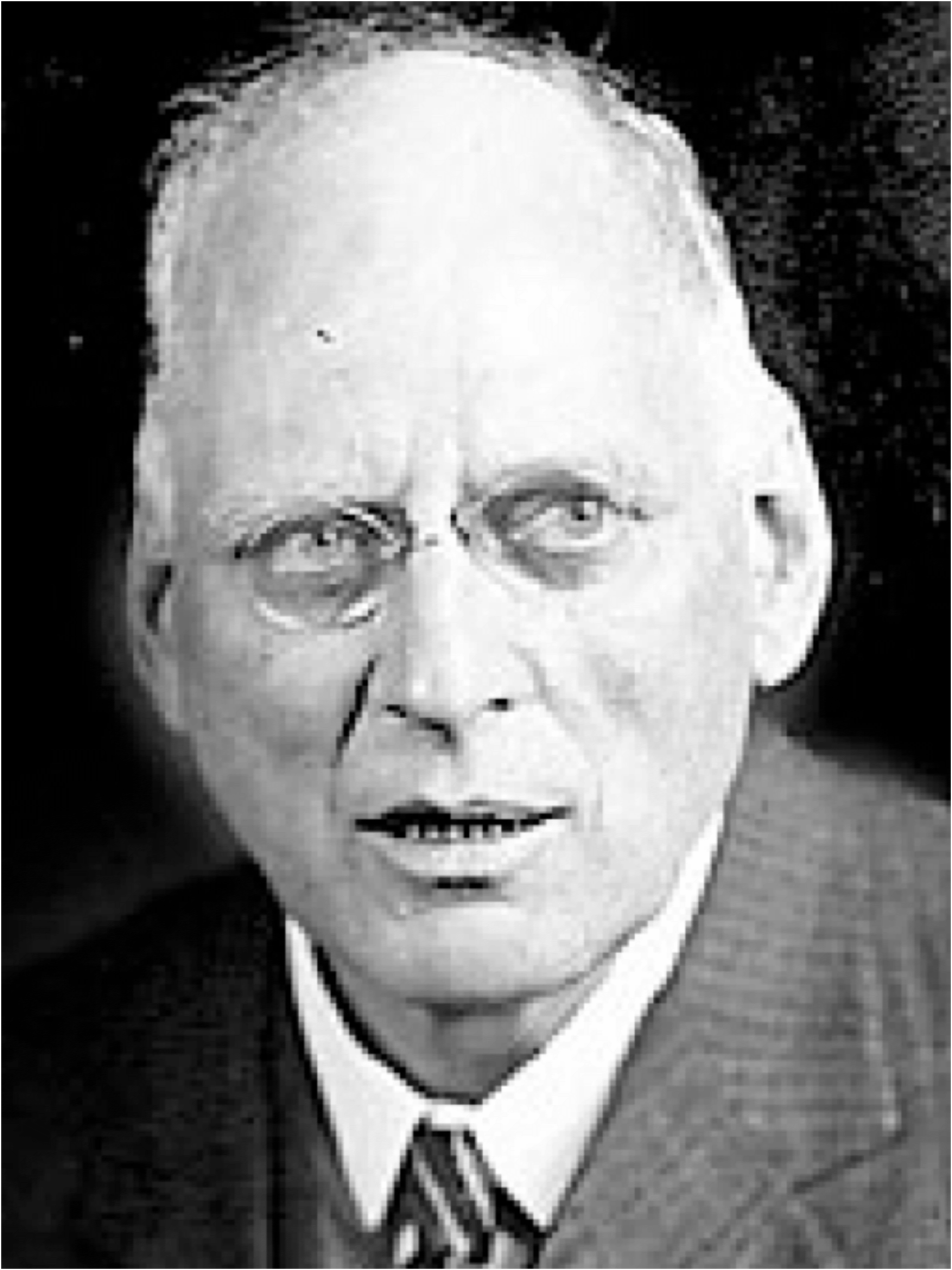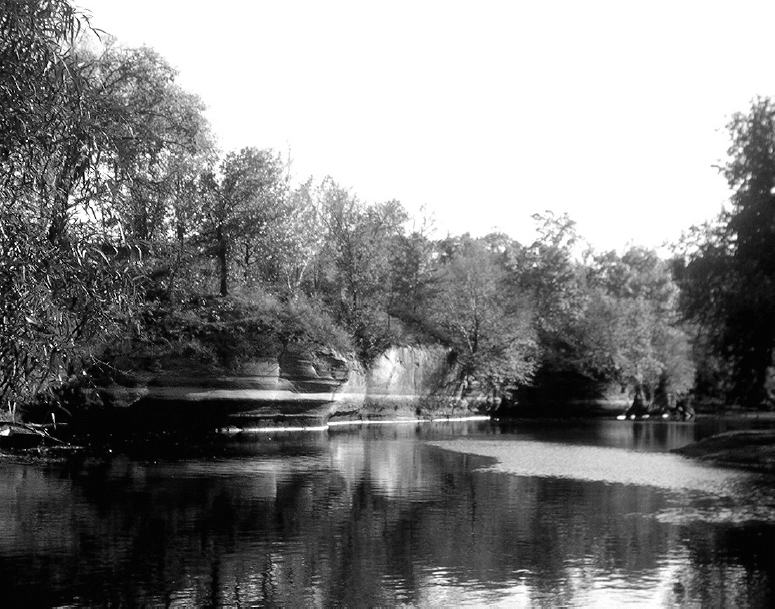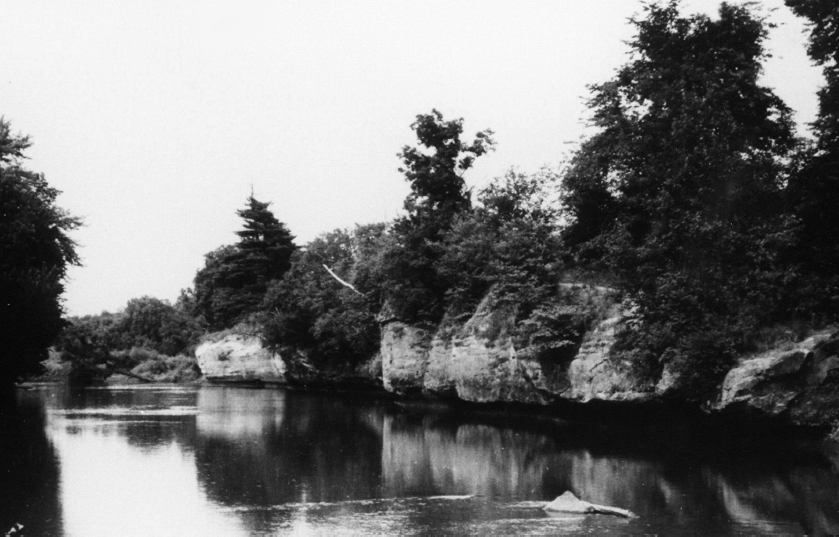
SRHS
Steamboat Rock Historical Society
THE DREAM OF A TOWN
Growing Through Adversity
Farmers anywhere and at anytime find weather to be a great leveler. Our pioneer forefathers were nearly all farmers. Even more than today these early farmers were at the absolute mercy of the weather and his life could be made miserable by floods, drouth, blizzards, wind storms, heat and cold.
Some of the most bizarre weather on record occurred in the first few years after Isaac Lesh settled here. During the winter of ‘55-’56, the snow and cold began on New Year’s day and continued through March. Driving blizzards from the Northwest piled up the snow at regular intervals and bitter cold filled the intervals between the storms. People had to enter their cabins through snow tunnels, and everyone ran short of food and fuel. Some did not survive.
At the time even wild game became scarce on the prairie. Elk sank through the crust of the snows and broke their legs; other were merely trapped and held until hungry settlers or wandering bands of Indians found them.
The very next winter ‘56-’57 was another “bad one.” The second started much earlier, with the first blizzard coming on December 1, and continued longer, but was not so severe. The prolonged snow cover and consequent shortage of food was blamed by many observers for the restless condition of Inkpaduthah’s band of Sioux Indians which culminated in the Spirit Lake massacre in March.
The year marked the very peak of the influx into central Iowa, and population doubled during 1856. It is hard to evaluate the severity of these winters without accurate weather records. Perhaps they were as bad as the winter of 1888, long famed in legend, or even 1936. But the pioneers were definitely much less prepared to survive through a severe winter, and many did not. There were many deaths, particularly of infants and small children.
In addition to the severe weather, a sharp economic recession now struck the country. When this was combined with the natural fear arising from the Indian troubles, (in other areas) a major slowdown in growth ensued. 1857 was said to be a discouraging year, and nature had still another trick up her sleeve.
1858 was known as the wet year. The rains began in January and continued all year long, a pattern quite different than that of 1851. The figure of 75 inches was mentioned frequently, but it was highly unofficial and it is impossible to document. The Iowa Natural Resources Council considers 1858 the year of Iowa’s heaviest rainfall.
The heavy rains greatly hampered travel, and of course growth was slowed. The roads, such as they were, were very soft, streams were very high, and sloughs bottomless. In addition to slowing travel, this also meant that communication with the outer world was for the most part completely cut off.
Farmers saw little let up in the rain even into July, which meant an almost total loss of wheat and oats and the loss of opportunity to raise a corn crop.
In the autobiography of Herbert Quick, a young man born here, who gained fame as an educator, lawyer, and author gave S.B. Cunningham credit for convincing his family to stay in the town of Steamboat Rock in this very wet year. His book One Man’s Life describes his families arrival.

Herbert Quick, teacher, author, lawyer. today considered by many a great pioneer historian.
“There were three ox-drawn wagons. One was that of my grandfather, the last John Coleman, with his wife, born Krum, and named Catherine, and his two grown-up daughters. The second belonged to my Uncle Matthew Coleman, with his wife and their little girl. At the beginning of the voyage of the prairie schooners, as they were called, my mother rode with her parents, accompanied by her young daughter. My father’s wagon carried his three boys, the eldest some thirteen or fourteen years old. While in mid-voyage my father and mother were married. Our family consisted therefore of what we used to call three sets of children, at least after my three full sisters and myself had put in our appearances.”
“Each of the previous marriages had been dissolved by divorce. And it is significant of the character of my parents that never the whole history of the family did I become aware of any slightest feeling on the part of my brothers and sisters that any partiality was shown by father or mother as between these offspring of former marriages or in favor of the later one.
“It was a train of three ox teams which kissed the forest good-by just west of Dubuque in July or late June of that rainy season of 1858. Each wagon represented one of thousands of home then in process of transplantation. Besides the oxen, each had the foundation of its breeding herds and flocks. They started with the germs of the future Iowa agriculture, cattle, hogs and poultry. Imagine It! The fowls were in crates tied to the back of the wagon. The cows were driven in a small herd. Each wagon had its little flock of sheep, too.
“Our people stated with hogs, too, meaning to drive them with the other live stock; but these useful beasts could not keep up even with ox teams; and streams swollen by rains, and which had to be forded, were too deep and swift for swine, so they were soon sold.
“It was a season remembered for decades as the wet year. The women and children often had to clamber out in the mud and water and rain while the goods were unloaded and carried to firmer ground to lighten the wagons so that doubled teams could drag them on west of the swales. The skies were gloomy. The summer air was often chill, or heated to sultriness as the thunderheads rolled up out of that luring west and broke in thunder and lightning and downpour. Cooking had to be done under these conditions over fires by the roadside. Yet still they pressed on, toward the hope which had preceded their fathers for two hundred years like a pillar of fire by night and of cloud by day.
“I have heard my father say that in that summer the earth was so wet that springs of living water broke out on the very hillsides and the wagons mired down on the steep ground.”
“You may imagine how these weary, wet and delayed pilgrims felt when they reached the Iowa River at Steamboat Rock, and seeking to cross it, so as to go on to what they called with cheerful generality, “the Fort Dodge country,” found that the river was far out of its banks and too deep and swift to ford or swim; and that the primitive ferryboat had been cast away somewhere, down by the rocks which gave the town its name. They camped on or near the ground where Root’s Hotel was afterward built and, for all I know, still stands. Near it was a stone house (in 2005) the Neilson house).”
“You think these miserable, wet–and, I have no doubt, dirty–people were avoided and looked upon askance by the community? You do not know the Midwest of those days. Instead of being avoided, they were welcomed. There lived in the village one S.B. Cunningham, a man long locally celebrated and known by no other name than Squire. He and others came to our people and urged them to stay at Steamboat Rock. Here, if they only knew it , was the place for which they had started. Any one could see that these people were poor; but that made no difference. Steamboat Rock wanted them to stay. Squire Cunningham owned or controlled the stone house close at hand . He would give them the right to occupy this dwelling for a month, rent free, if they would only stay and give the locality a chance.
“Everything in their wagons was wet and moldy. They wanted to dry out. They had long arrears of laundry work to take up. They were weary of the everlasting splash, splash of the wheels and of the oxen’s feet in the mud. ‘Weariness’ is not a strong enough word to apply to the condition of these women; and they all yearned to see how it would seem to sleep with a roof over their heads. They all wanted to get out of the wet. So they yielded to the hospitable arguments of the people and stayed in the locality permanently.”
“If the Iowa River had not been so high, I should have been born somewhere in western Iowa. Perhaps I should have been scalped in the Indian troubles of a few years later.

“As I recall these circumstances so typical of the process of the peopling of the midwest, I find myself without the slightest knowledge as to what my father possessed, aside From a new wife with a daughter some four or five years old, three sons of his own, ranging from fourteen or so down to one just emerging from infancy, his wagon and oxen, and chickens, the sheep and Shakespeare (the family cow). He must have had a little money, for the family had to live; and it was too late in the season to grow much that year. Such a migration took grim resolution, faith–or blindness.”
“My grandfather and my uncle had sold small farms in Wisconsin and were able to buy similar tracts in Iowa. They located in Shiloh Township, out in Grundy County, and soon built houses, planted groves and made homes.
“Our family left the others in the village (Steamboat Rock) and went out to a farm which was usually referred to as the Billy Nicholson Place, but which my father habitually called “the old Doubting Castle.” I never saw it, but I heard it discussed frequently. This was a log house. Too bad, but I wasn’t born in it. It stood some two miles south of Steamboat Rock.

The rock formation that Steamboat Rock was named for.
© 2020 Steamboat Rock Historical Society | All Rights Reserved
Powered by Hawth Productions, LLC